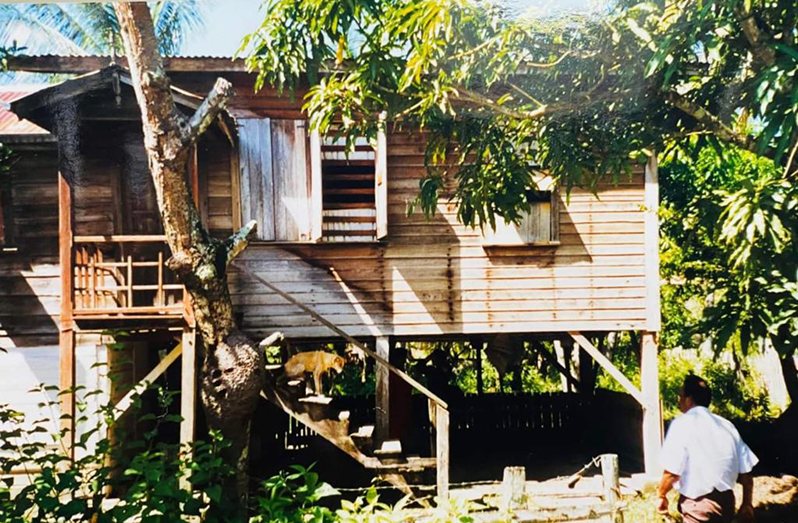MORNING in the countryside, veiled still in darkness but nudged awake by soft devotional songs on the radio, the aroma of breakfast in the air, the creole fowl-cock crowing and the donkey’s bray somewhere down the street—because the cane harvesters always had to leave early for the backdams.
So, it begins for the people in the sugar estate communities, and each day tells a story of sweat and toil, tears, laughter, and celebrations. A people who had come a long way from indentureship to those days in the mid-70s, with a long way more to go, and the aged women in their small gardens, cook-shops and market stalls, the real testimony of that era. Young girls they had been, brown-skinned, bright-eyed, portraying an innocent ignorance of the world in their romal headpieces, petticoats and bare feet. The young, delicate bodies, pushed to the extreme—they had worked the land, tired muscles searching for a dream, riding the waves of time through many thorny paths, and from the sweat of their brows and the naked fatigue of their bodies, they had carved smooth paths for their children to walk.
The bodies have now grown old, the hands weak, the smiles wrinkled, but there were still glints in the eyes and music in the laughter, and each day from dawn to dusk was a day to live for something. For Rosaline, her vegetable garden was her life, and at the dawn of each day, she would whisper silently her prayers to the sun and drink a few dew drops from the hibiscus leaf—for it was something pure from nature, and thus begins her day. The thyme, the celery, and the tomatoes she sold at the town market. The sound of a conch shell from down the road was her old workmate, Sumintra—now a fish vendor—her livelihood.
“Eh, gyal Rose,” Sumintra called, “How yuh deh?”
“Lil older every day,” Rose responded with a little laugh.
“Yeah gyal, dat is life.”
 Sumintra parked her fish cart as the neighbouring women came out to buy, and she stayed longer to have a little chat with her friend, sitting on the bench under the cashew-pear tree. It’s a culture, they say, for the women who shared so many memories of the past—a door so easy to open. The news of the day, though, sometimes takes the spotlight, and Irene, another friend, coming down the road on wobbly legs with a small basket, was always in the news. A young boy riding past almost hit her, and she unleashed a string of expletives as long as the street. Rose and Sumintra helped her through the gate and she sat down with relief.
Sumintra parked her fish cart as the neighbouring women came out to buy, and she stayed longer to have a little chat with her friend, sitting on the bench under the cashew-pear tree. It’s a culture, they say, for the women who shared so many memories of the past—a door so easy to open. The news of the day, though, sometimes takes the spotlight, and Irene, another friend, coming down the road on wobbly legs with a small basket, was always in the news. A young boy riding past almost hit her, and she unleashed a string of expletives as long as the street. Rose and Sumintra helped her through the gate and she sat down with relief.
“Yuh start on de bottle early,” Rose said, noticing her tipsiness.
“Yeah, meh sista,” she answered, and then turned to Sumintra,
“Wah happen gyal, Sumi? Meh nah see yuh long.”
“Meh bin ah me daughta, in Corentyne, she get another baby.”
“Oh good, meh guh tek a drink fah dah.”
From a quarter bottle of El Dorado rum in her basket, she took a drink and, lighting a cigarette with shaky hands, leaned back with a sigh.
A girl from the Catholic Church, she had been working toe to toe with her husband in his farm, then the rice field and, in the end, a bar. She was luckless in marriage, for after three husbands—all departed—this was all she had left, the children having moved on with their lives, visiting not too often.
“Gyal, ayuh see Haroon?” a loud voice called from the road.
It was McKenzie, the African lady from further down the back street.
“Wah happen, Kenz?” the ladies asked.
“Meh lukin fuh dis man because he owe me some money and he dodgin’ me.”
“Yuh better check de ‘Shaolin Temple’,” Sumintra said. “Is deh he does deh drinking wid he pals.”
“Yuh see when ah catch he, ah gon put dis hand pon he.”
McKenzie was a no-nonsense, big-built woman, a single mother with eight children. She sold the tastiest black pudding in that neighbourhood and often bought thyme from Rose. She took a good drink from Irene’s rum and left, as Chilarie, from three houses away, came in fuming.
“If ah had size like Millie, ah woulda wuk some lash in he.”
“Who bada yuh gyal?”
“Da no-good son-in-law wha me gat. He thief me nice Rhode-Island fowl and do bush cook wid he friends and then tellin’ me dah de fowl fly away.”
Now, that was a laugh, and Irene choked on the drink she had just taken.
Rose’s granddaughter, riding in with her bike, shook her head with a patient smile.
“These old ladies, you gotta love them.”
A while later, Irene got up to go but couldn’t make it, having gotten too intoxicated—and being old ladies, there was only one way to take her home. They washed Sumintra’s fish cart, dried it, and lined the inside with sheets of newspaper. They put Irene in and pushed her home.
The scene was so funny, that everyone down the street laughed, and to this day, stories of the life and times of these women—the Back Street Girls—are told and retold, for like gold, its richness is invaluable.



.jpg)










